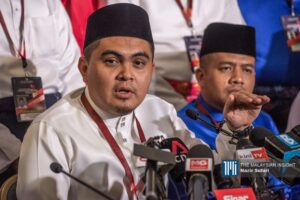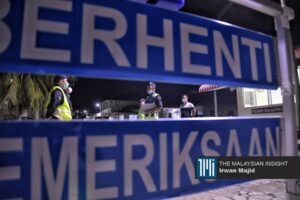AS Malaysia celebrates its 61st birthday, Project for Stability and Accountability for Malaysia (Project Sama) proposes increasing the number of senators in the Dewan Negara (Senate) by 15 each for Sabah and Sarawak. This will ensure East Malaysia has a one-third veto power to block unilateral constitutional amendments by West Malaysia.

Article 45 of the Federal Constitution allows for 70 senators, with Sabah and Sarawak each electing two members, and another federally appointed senator representing the Federal Territory of Sabah. This amounts to just 4.29% representation for East Malaysia. The proposal to add 30 senators from Sabah and Sarawak would bring their total representation to 35 members in a 100-member Senate, giving them exactly 35% under what is called the Dewan Negara 35/100 proposal.
Projek Sama urges all parties that support a constitutional veto power for East Malaysia to back this proposal and amend Article 45. This goal could be realised during the parliamentary session starting on October 14, allowing the veto power to take effect by the time parliament reconvenes in March.
Here are three key advantages of the Dewan Negara 35/100 proposal compared to the more complicated demand for 35% representation in the Dewan Rakyat:
Realisable before GE16
The Dewan Negara 35/100 proposal can be implemented simply by amending Article 45. Since the current government holds a two-thirds majority, it can pass this amendment without difficulty. Perikatan Nasional (PN) would likely support the move unless they fundamentally oppose an East Malaysian veto bloc. More detailed reforms of the Senate can follow once this formula is in place.
In contrast, the Dewan Rakyat 35% demand is unlikely to be achieved before the 16th general election (GE16), which must be held by February 2028. It requires three stages: negotiations on the number of seats for each state, an amendment to Article 46, and constituency delimitation, which could take up to two years. Given the rapid changes in Malaysian politics, East Malaysians should secure their veto power early through the Dewan Negara 35/100 proposal.
No bloating of parliament
The proposal achieves East Malaysia’s veto power by increasing the number of senators by 30, which would likely be accepted by the public. On the other hand, the Dewan Rakyat 35% demand could lead to a bloated parliament. Proponents of this demand have not specified how they would achieve 35% representation, leading to potential controversy. West Malaysian MPs are unlikely to agree to transferring 21 seats to East Malaysia or adding more seats only for East Malaysia when many West Malaysian constituencies exceed 200,000 voters. Adding an equal number of seats for both East and West Malaysia would result in a Dewan Rakyat with 360 seats.
Without parliamentary reforms to improve lawmaking and policy scrutiny, the public would likely reject such a massive expansion of parliament.
Affirmation of East Malaysia’s special status
The Dewan Negara 35/100 proposal would affirm East Malaysia’s veto power, elevating Sarawak, Sabah, and Labuan as special regions within the Federation. This would go beyond the Malaysia Agreement 1963 (MA63), which did not guarantee veto power for Sabah, Sarawak, and Singapore, despite many claims to the contrary.
Sabah and Sarawak’s over-representation in Malaysia’s first parliament (15% and 10%, respectively) was outlined in the Inter-Governmental Committee (IGC) report in 1962 but was never linked to Singapore’s seats or veto power. This guarantee ended in August 1970, as per Article 161E(2)(e) of the Federal Constitution.
The Dewan Negara 35/100 proposal would be a clear affirmation of Sabah and Sarawak’s special status within the Federation, aligning with democratic norms. In federal systems, the Senate often represents state rights, and over-representation and veto power for smaller or special states are justified. – September 16, 2024.
* Projek Sama, an initiative advocating for institutional reforms for political stability and accountability.
* This is the opinion of the writer or publication and does not necessarily represent the views of The Malaysian Insight. Article may be edited for brevity and clarity.






